Programs Building a Solidarity Economy
CEANYC members learn, grow, build, and resist together in a suite of peer-led programs.
Training, Education, and Technical Assistance
All of our offerings plug gaps in the training and assistance available to low-income and moderate-income people in New York City’s cooperative and solidarity economy. We provide meals, English/Spanish interpretation, and childcare at these sliding scale events unless otherwise noted. Partial and full scholarships are available for day-long or multi-day programs. We value local expertise over national consulting professionals, and most of our offerings are facilitated by trained peer educators. Folks come to CEANYC not only to learn, but to build their local network.

Cooperative Leadership Institute
A 2 hour overview of solidarity and cooperative enterprise principles and values, the landscape of such enterprise in NYC’s neighborhoods, and networking with groups active in the space. This workshop is designed to support those already in the field to learn more about the work of others.
Email organize@gocoopnyc.org to request a Co-op Road Show in your neighborhood or borough.
Similar to the Co-op Road Show, this introductory workshop is for groups interested in learning more about the field who may not yet be participating, or whose participation may be limited to a particular sector or model of cooperation.
A day-long session for co-op and nonprofit board members to deepen their knowledge of fiscal oversight, staff management, membership and representation, racial and social justice, governance, and legal responsibilities. Participants leave with the resources and plan needed to implement change and increase effectiveness.
This workshop can be provided to multiple or individual co-ops. Email organize@gocoopnyc.org for more details.
A “deep-dive” training designed to build the skills and analysis needed for functional personal work ecology, leading values-aligned decision-making, and addressing oppression and power in an organization. All while building a network of peers to support ongoing economic and political cooperation
See more information about this year’s Cooperative Leadership Intensive.
New Yorkers under 30 who want to learn more about solidarity economy models built by and for everyday New Yorkers are invited to join #GenerationSolidarity programs. These workshops, tours, events, and activities introduce young people to new organizations, create valuable peer and career networks, and help build skills and analysis needed for emerging cooperative leaders.
Email Evie at evan@gocoopnyc.org to learn more!
Our Peer Educators are solidarity economy practioners across New York City who are paid to develop CEANYC programs, speak on solidarity economy panels, and facilitate workshops.
Interested in joining our team? Fill out this application and reach out to organize@gocoopnyc.org with any questions!
CEANYC Peer Educators have developed a unique two-day workshop on anti-racism and anti-gentrification specific to food cooperatives.
Technical Assistance
We offer a wide range of assistance, from mediation and facilitation to advising on political relationships, marketing, and fundraising.
When we are unable to offer support ourselves we refer to trusted organizations and individuals in our national and international network to help meet the need.
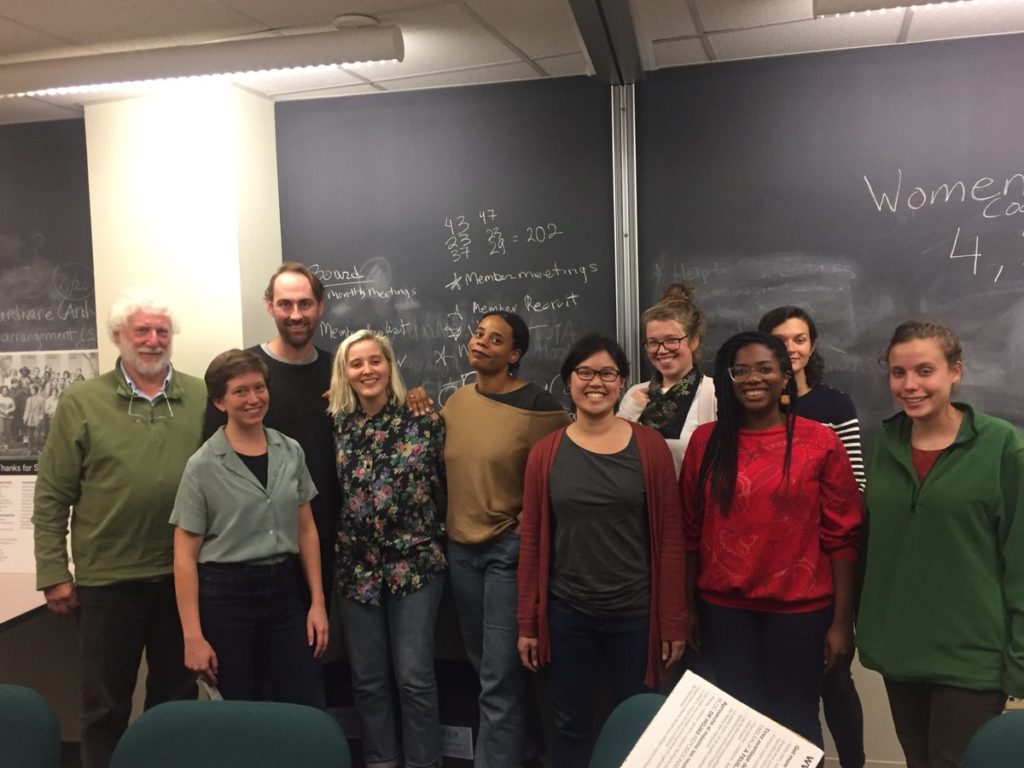
Policy and Advocacy
All of our offerings plug gaps in the training and assistance available to low-income and moderate-income people in New York City’s cooperative and solidarity economy. We provide meals, English/Spanish interpretation, and childcare at these sliding scale events unless otherwise noted. Partial and full scholarships are available for day-long or multi-day programs. We value local expertise over national consulting professionals, and most of our offerings are facilitated by trained peer educators. Folks come to CEANYC not only to learn, but to build their local network.
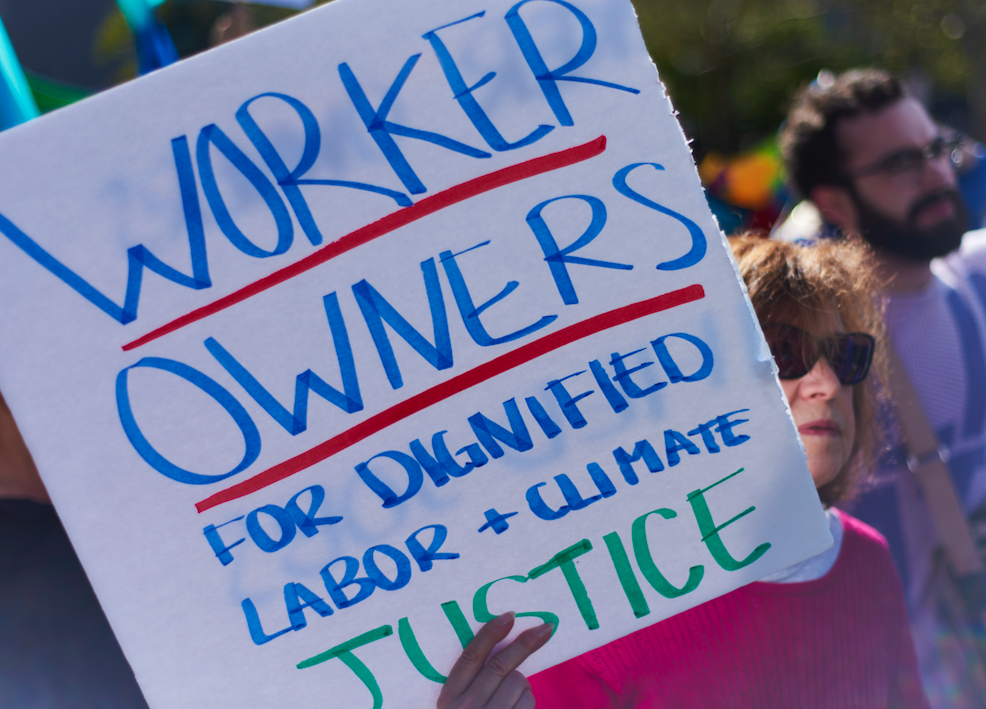
Cooperatives for Social and Racial Justice
Cooperatives and solidarity economy enterprises can be transformative sites of resistance to the usual way of doing things, in politics and in business, but not without intention and action! As CEANYC members we are developing our collective capacity for action.
We mobilize on issue campaigns led by coalitions and associations where we hold membership such as NYRenews, American Sustainable Business Council, National Cooperative Business Association, US Federation of Worker Cooperatives, and New Economy Coalition. When there are calls to action from these groups we mobilize, and in turn we seek support from them for raising the visibility of solidarity economy enterprise.
We support the sectoral advocacy of CEANYC members at the municipal, state, and federal level, particularly in partnership with associations like NYC Network of Worker Cooperatives, Urban Homesteading Assistance Board, NYC Community Gardens Coalition, or Inclusiv . This also includes supporting issue-based campaigns that focus on significant issues within the communities that make up our co-ops and neighborhoods, including housing, healthcare, and policing.
Visibility and Research
Unlike traditional businesses, cooperatives and solidarity economy enterprises don’t have budgets for advertising , fancy networking events, or opportunities to raise shareholder capital. Often, people don’t even know we exist! This problem is exacerbated by scant data collection by government or traditional business research groups.
To meet this gap, CEANYC engages in original research, marketing, and visibility initiatives to gather the necessary data and raise the profile of cooperatives and solidarity enterprise.
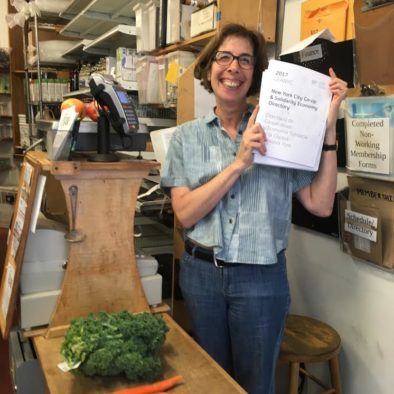
Marketing and Communications
CEANYC promotes co-ops at local events and through direct mail and online platforms. We’re also exploring joint advertising and innovative rewards programs together.
In partnership with Cooperative Development Institute, Data Commons Cooperative, and Cabot Creamery Cooperative we’ve also produced a bilingual English/Spanish printed booklet with more than 2000 entries to act as a “yellow pages” and contact list for co-ops and solidarity economy initiatives in our neighborhoods. It is the first and only directory of its kind in New York City.
CEANYC also provides consulting and media services to members including pitching media outlets, signal boosting, or providing pro bono social media tune ups and photography services. Email organize@gocoopnyc.org.
Value Chains Summit
Currentl,y regional cooperatives do not have any cross-sectoral association or event to bring them together to discuss economic and political cooperation. We’re completing research to bring these actors together for the first time, touching off new value chains, knowledge-sharing, and opportunities for collective action. Would you like to sponsor this event? We’d love your support. Email organize@gocoopnyc.org.
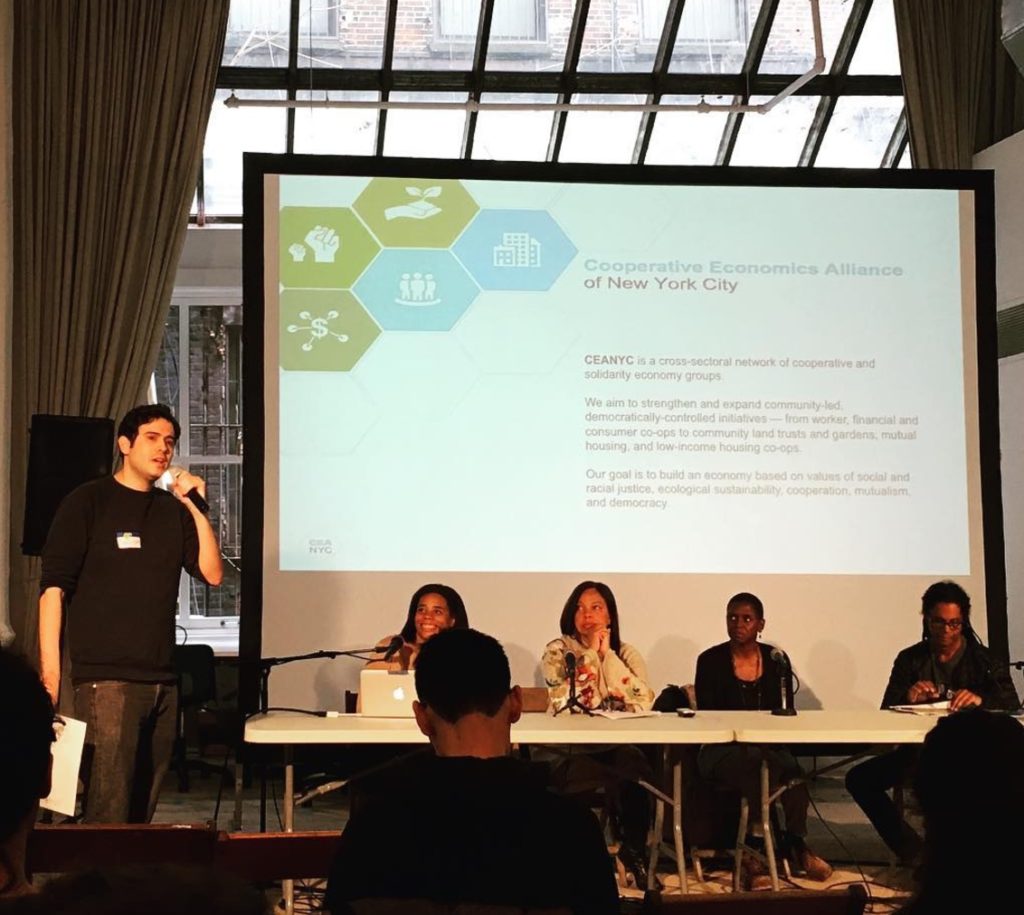
Solidarity Economy Giving Project
New York City’s solidarity economy includes more than 2000 organizations spread across all five boroughs primarily serving women, people of color, immigrants, and low-income communities. These democratic organizations meet neighborhood needs in every area of the economy, from food to finance, housing to culture. Most do not fit within the frameworks used by philanthropy and finance and also receive scant government support. The Solidarity Economy Giving Projects helps bridge this resource gap.
*Note: The 2020 Solidarity Economy Giving Project is now closed and no longer accepting applications for grants. Please be on the lookout for our 2020 Annual report and thank you!*
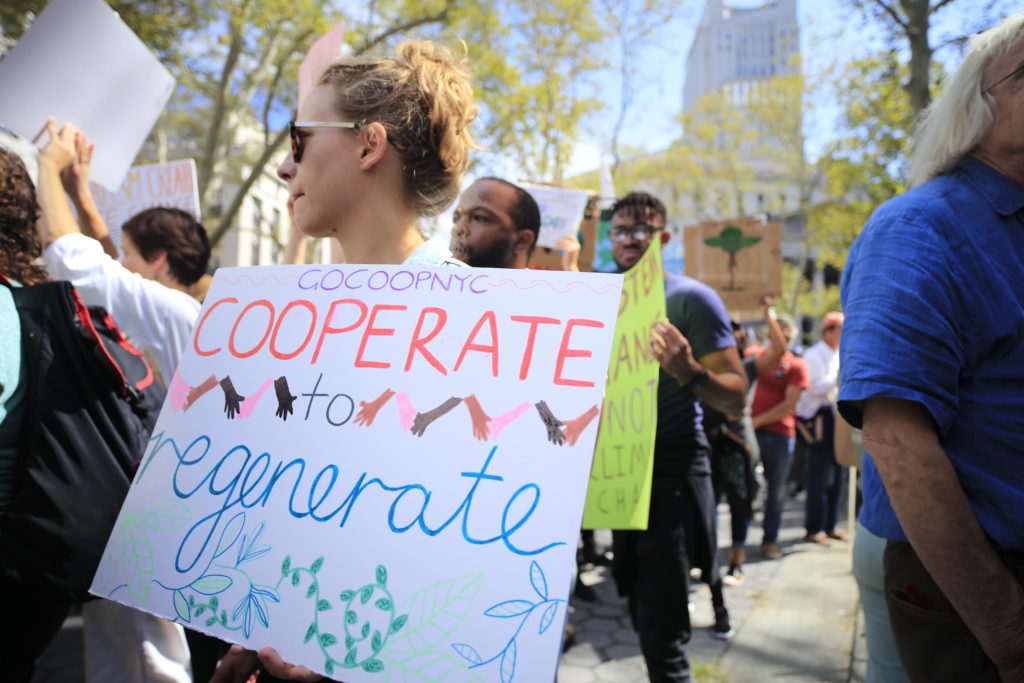
Solidarity Economy Giving Project
The Solidarity Economy Giving Project (SEGP) raises funds for grants made to NYC solidarity economy groups. The SEGP hosts a Giving Circle annually – a group of donors committed to collectively moving money to build an economy in New York City that is based on values of social and racial justice, ecological sustainability, cooperation, mutualism, and democracy. SEGP Giving Circle participants build community together and learn about the solidarity economy from seasoned organizers and community leaders. Each member makes a meaningful gift of at least $2,000 to the Giving Project Fund to support solidarity economy organizations.
“Participating in the Solidarity Economy Giving Project was a powerful experience in both building community with other young people committed to social and economic justice in our city and in forging relationships with bold grassroots groups that are laying the groundwork for a just, sustainable, and democratic local economy.”
-Mike Sandmel, Giving Circle Participant
What to expect:
- Deepen your knowledge and awareness of solidarity economy practices in the five boroughs
- Identify how race, class, and gender shape your experience and that of solidarity economy groups
- Make meaningful contributions to grassroots changemakers with the least access to resources and power
- Build analysis with a community of givers to transform how we move money together
- Connect to solidarity economy leaders and organizations proving another economy is possible and growing in NYC
- Strengthen your communication, facilitation, accountability, and fundraising skills
- Make a meaningful financial gift of at least $2,000 to support solidarity economy organizations (people typically give between $2,000-$12,000)
- Help to organize a party to celebrate and share giving circle experience with your communities
The giving circle will meet monthly from January to June 2020. The first meeting will be a half-day session on January 12th, 2020 with following meeting dates to be set by the group.
SEGP funds are pooled and CEANYC’s Board, which is elected by the democratically controlled member organizations of CEANYC, decide how to distribute the money. This helps to shift the problematic power consolidation that is the norm in funding, in which those with wealth also decide whose work is worthy of grants. The Board practices transparency in grantmaking by issuing an annual report and presenting the grantmaking and expenses of the SEGP at the membership Annual Meeting.
Giving Party
The Solidarity Economy Giving Party held in the spring of each year with food, signature cocktails, door prizes, and dancing. Come and join us in a new kind of philanthropy, focused on giving rather than grantmaking, solidarity rather than charity. Move money to those working to transform our economy who need it most and have a blast while you’re at it!
If you would like to sponsor or volunteer at this event please email organize@gocoopnyc.org.
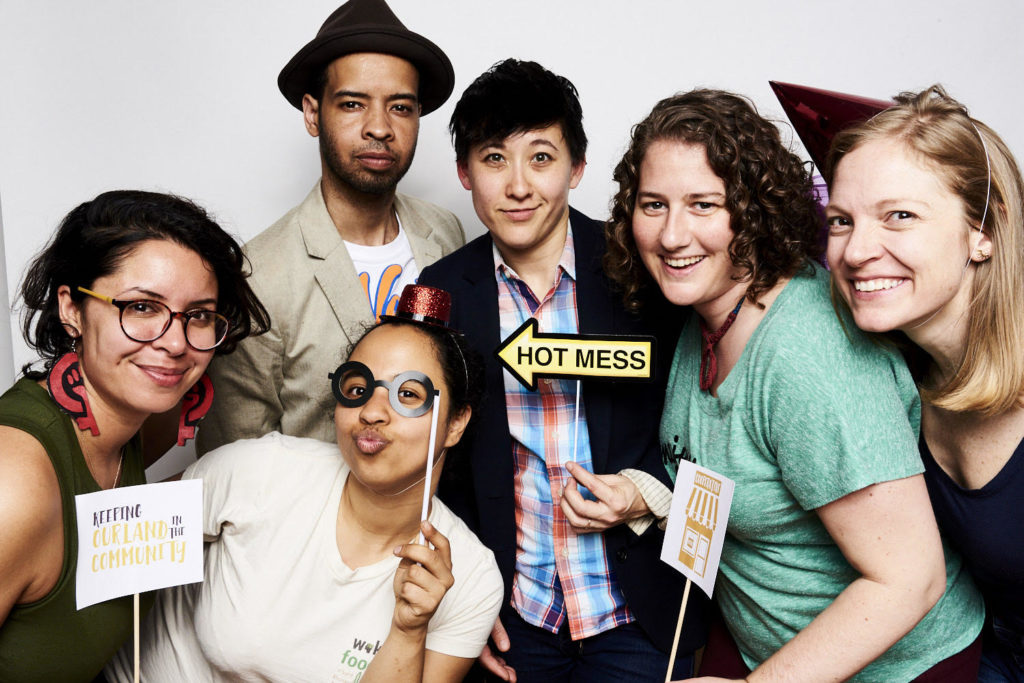
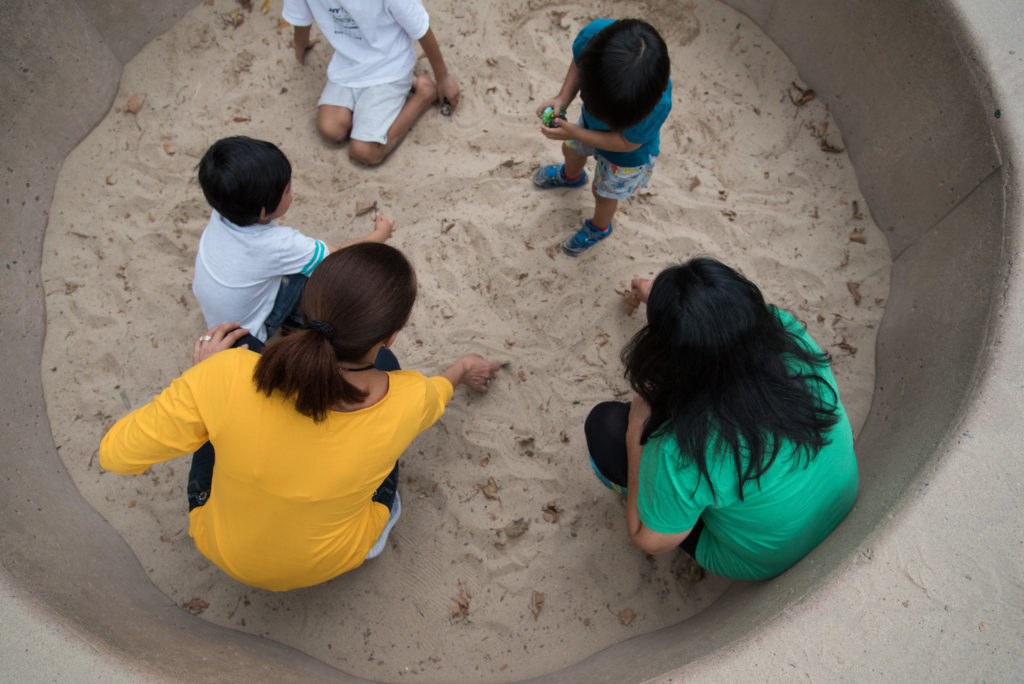
Grants
Note: The 2020 Solidarity Economy Giving Project is now closed and no longer accepting applications for grants. Please be on the lookout for our 2020 Annual report and thank you!
All CEANYC member organizations are eligible whether they are 501c3 nonprofits, incorporated as cooperatives or LLCs, or are unincorporated. This include groups who joined CEANYC through shared membership agreements with NYC Network of Worker Cooperatives and Urban Homesteading Assistance Board or who are members of Inclusiv: The National Federation of Community Development Credit Unions or NYC Community Gardens Coalition. Groups that are members of networks such as Brooklyn Queens Land Trust, and Just Food may also apply, but priority is given to groups covered under shared membership agreements. Individuals may apply but must be sponsored by a group in the above categories. Groups may only receive funding once per a calendar year. If you aren’t sure about your eligibility you can check the Membership Directory to see if your organization, or a network your organization belongs to, is listed. If it is not you can join CEANYC for at no cost by filling out a membership form.
Funds may be used to cover a range of expenses and activities including, but not limited to:
- Event Sponsorship (This includes fundraising parties or galas, conferences, public events, or gatherings.)
- Scholarships to attend conferences, trainings, and events, or to access technical assistance or coaching (This might include large gatherings or individual training or assistance from a cooperative or solidarity enterprise expert.)
- Crowdfunding campaign matches (This is only available if your group is a 501c3 nonprofit or is partnered with a 501c3 nonprofit that can receive the funds.)
- Emergency assistance (This might include recovery from a climate or natural disaster or responding to a crisis that jeopardizes your group.)
We have left these categories as broad as possible to allow us to distribute funds with the most flexibility.
Grants are made in amounts of $500-$5,000.
In the 2020 cycle CEANYC’s Board of Directors will be determining gift allocations. The Board uses the following criteria to determine funding:
- Group meets eligibility requirements
- Need (Can this money come from anywhere else or is CEANYC the only or a primary source of funds?)
- Sectoral diversity (Gifts are spread evenly across our membership of credit unions, worker co-ops, food co-ops, community gardens, CSAs, housing co-ops, community land trusts, and co-op or solidarity economy organizations.)
- Mission-alignment (Gift meets CEANYC’s mission to serve low-income communities and advance racial justice)
Any eligible group can apply at any time in the calendar year by filling out this short form.
2019 Grantees
Read the full 2019 report here!
Kelly Street Garden (Bronx community garden)
$1000 for participation in Cooperative Leadership Intensive training
Samamkaya Yoga Back Care and Scoliosis Collective (Manhattan worker co-op)
$3000 to subsidize classes for people with disabilities
Worker’s Transport (Brooklyn worker co-op)
$3000 to support start-up costs for opening a bike shop in Bed-Stuy
Action OSH (Queens worker-coop)
$4000 to translate a construction worker safety training manual into Bangla
Desperation HDFC (Manhattan low-income housing co-op)
$1400 to purchase fire extinguishers for seventy shareholders in Harlem, many of whom are seniors
Oliver Gardens HDFC (Bronx low-income housing co-op)
$2500 to purchase and install LED lightning to meet insurance requirements
Cards by De (Bronx worker co-op)
$1500 to cover training and consulting to support start-up greeting card enterprise led by Black women
Tribe CoCreate (Bronx worker co-op)
$2500 to cover start-up costs for a Black women’s co-working space
568 W. 171st St. HDFC (Manhattan low-income housing co-op)
$900 to cover cost of a bike rack for residents in Washington Heights
White Pine Community Farm (Hudson Valley worker co-op/CSA)
$3500 to expand CSA program to low-income families
Maharlika Cleaning Cooperative (NYC worker co-op)
$4000 towards mediation for Filipina cooperative cleaning enterprise members
Co-op Cafe (NYC worker co-op)
$2500 for espresso machine and start-up costs for cooperative coffeeshop organized by low-wage workers
517 West 184th Street (Manhattan low-income housing co-op)
$2500 to build a conference room for shareholder meetings in Washington Heights/Ft George
Sunset Scholars LLC (Brooklyn worker co-op)
$3000 to provide tutoring scholarships for low-income children by Sunset Park immigrant tutoring cooperative
BK Rot (Brooklyn community garden collective)
$2000 to purchase technology and provide training to young people of color who operate the collective’s business in Bushwick
2018 Grantees
Read the full 2018 report here!
Black Conference
$1200 for the Falconworks Theatre Company’s production centered around Jessica Gordon-Nembhard’s Book “Collective Courage.”
The People’s Garden
$2500 to support immigration and housing justice organizing in Bushwick.
Northwest Bronx Community Clergy Coalition
$1500 towards economic democracy training for Bronx residents.
Cooperative Leadership Intensive
$7,900 towards participation in our CLI for 8 women in NYC’s solidarity economy.
Brooklyn Packers
$3000 to hire a staff person to subsidize low income CSA work in Central Brooklyn.
224 Lefferts Avenue HDFC
$4000 to cover the costs of essential repairs in their home.
Third Root Community Health Center
$4000 for staff support, and facilitation.
Woke Foods
$2500 to cover the costs of project management and growth of staff
Lefferts Community Food Coop
$2500 to expand inventory and store hours, and cover the cost of insurance.
Loisaida United Neighborhood Gardens (LUNGS)
$2500 towards youth programing for garden organizers on the Lower East Side.
BK Rot
$2500 towards an electronic cargo trike.
Central Brooklyn Food Cooperative
$4600 towards their first member orientation and Grub Party and matching funds for a 2019 crowdfunding campaign.
A Bookkeeping Cooperative
$2000 towards conflict resolution training.
